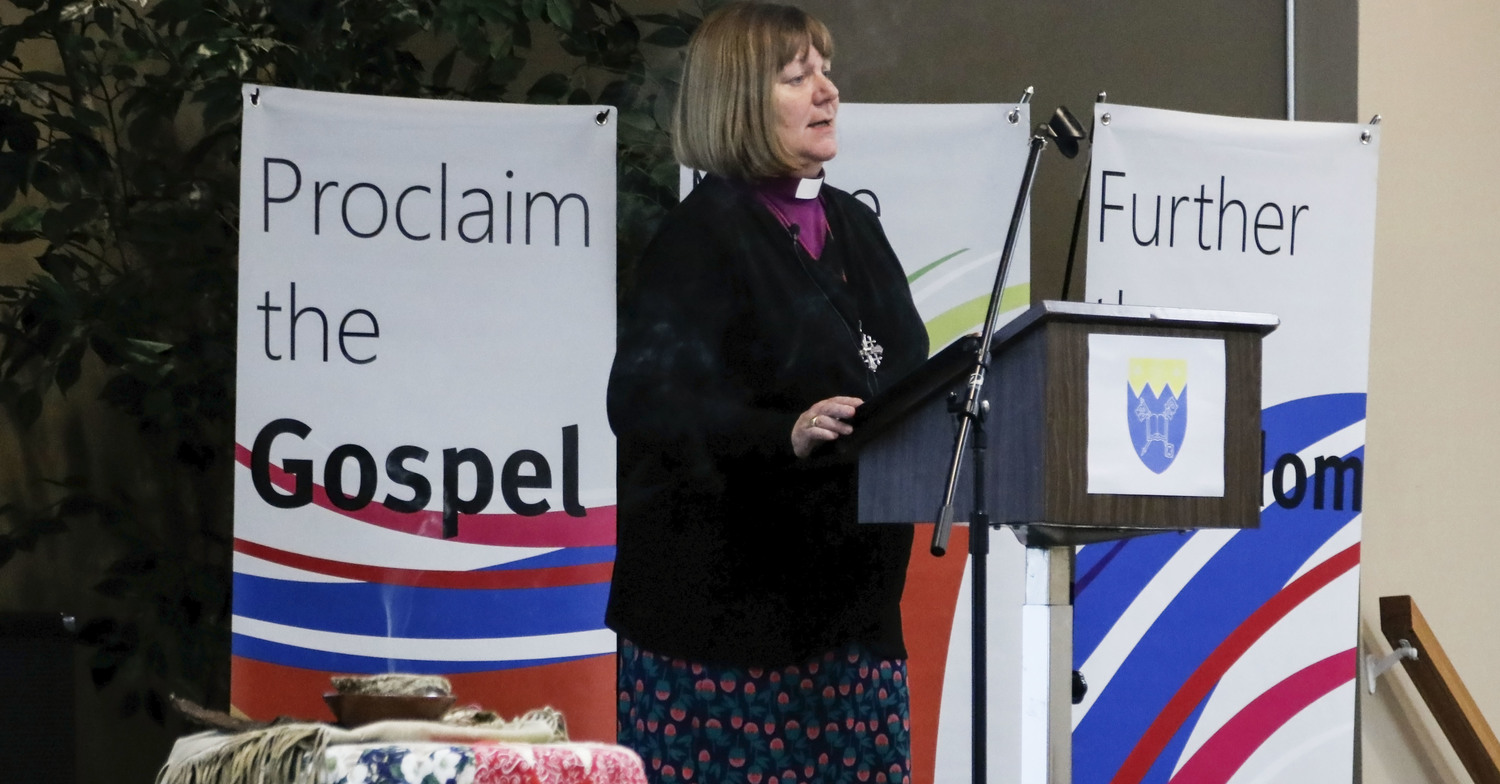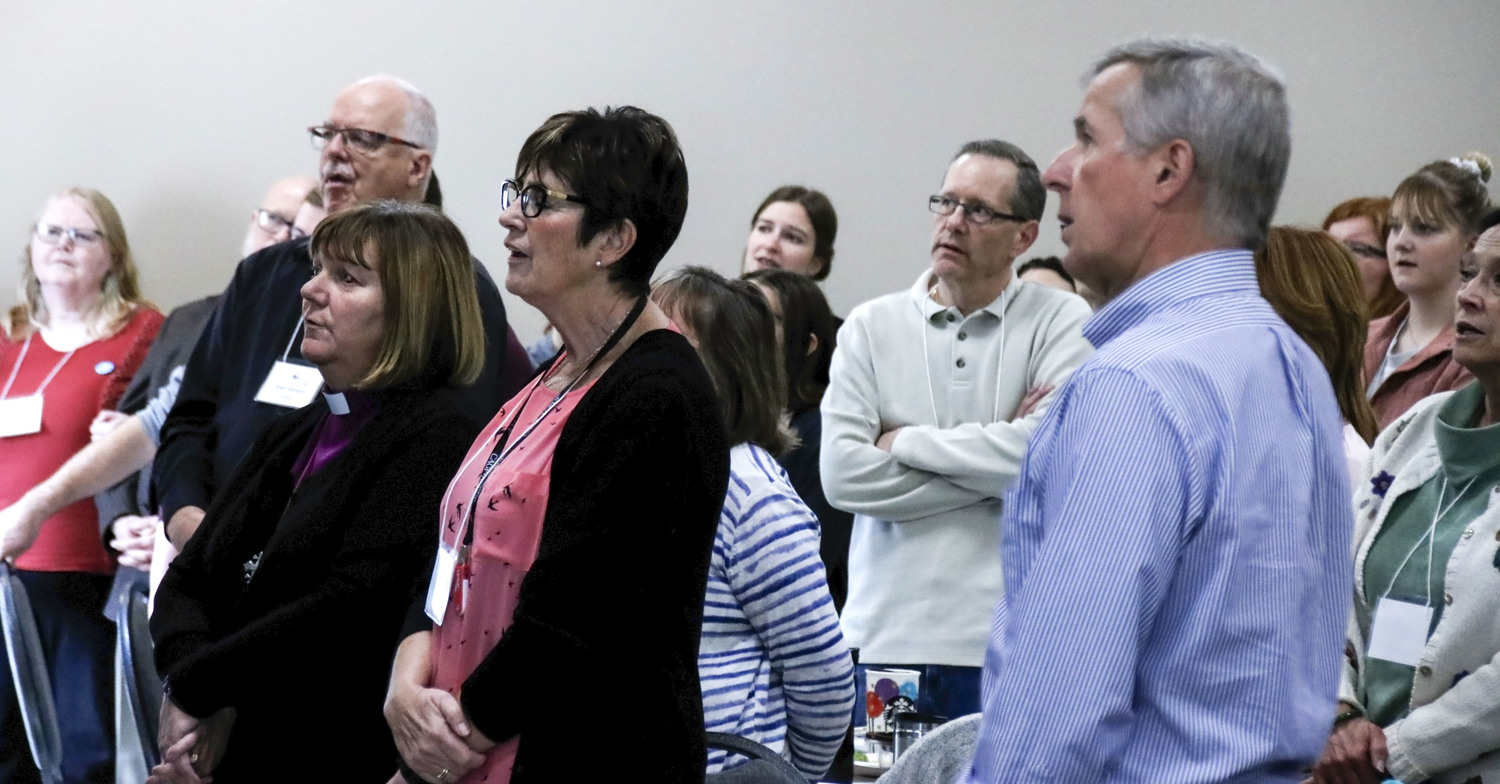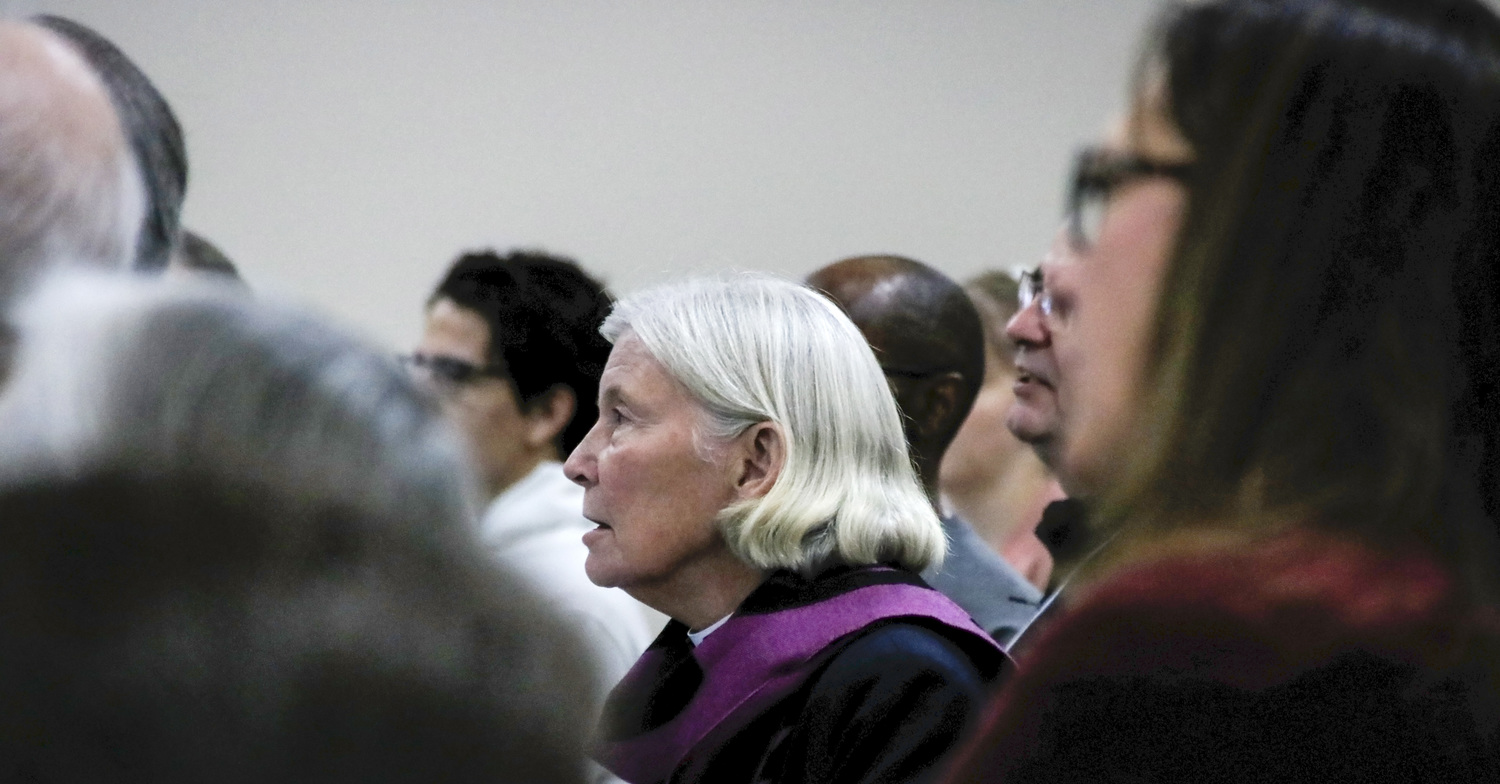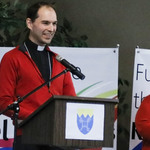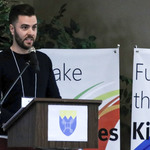The 66th Synod of the Diocese of Edmonton was a manifestation of the resourceful, creative, often unexpected ways God is empowering us to use our gifts to respond to the needs of others and, in so doing, grow communities that are places of belonging, places of sharing and places of love.
The Rt. Rev. Dr. Jane Alexander, Bishop of Edmonton, interrupted a six-week personal leave of absence to convene synod on the evening of October 4, 2019 at All Saints’ Cathedral. In a break from tradition she invited a guest preacher, Fr. Michael Lapsley, Canon of Reconciliation and Healing at All Saints’ Cathedral and St. George’s Cathedral in Cape Town, South Africa, who was accompanied by his colleague Philani Dlamini, to give the sermon for the Opening Eucharist Service.
Synod began on the last day of the Season of Creation (that we have been called to support by both our own General Synod and the Anglican Communion) and the Feast Day of St. Francis of Assisi, patron saint of ecology. At the 64th Synod, Bishop Jane asked parishes to help uphold the Fifth Mark of Mission and safeguard the integrity of creation by eliminating single-use plastics, Styrofoam and plastic cutlery; and use only recycled paper products in offices, washrooms and kitchens. She challenged parishes to live, both “personally and corporately, in such a way that shows our stewardship of creation,” and to use only sustainable and renewable supplies by December 31, 2019.
Several parishes have already started taking significant steps toward becoming a green church. Synod heard presentations on eco-friendly initiatives such as collecting recyclable bottles and cans to finance a green audit; switching to LED lighting; applying for grants to finance a solar energy system; and creating a parish environmental policy.
During the Opening Eucharist, synod observed a moment of silence to honour of the lives of missing and murdered Indigenous women and girls. The diocesan Indigenous Ministry Initiative (IMI), is described by Bishop Jane as “a recognition of our call to serve and walk with our brothers and sisters, whether in the downtown core or in one of the Treaty Six or Eight First Nations communities in the Diocese of Edmonton. The IMI team continues to grow and now includes local elders, clergy and laity, including Cree, Métis and Mohawk, and settlers, among them the Bishop herself.
The IMI has taught us “a great deal about our approach to reconciliation and healing and what respect and trust look like,” she said. “We continue to work closely with Michael Lapsley of the Institute for the Healing of Memories to help us be better listeners one to another.”
Bishop Jane welcomed several guests to synod, including the Rev. Matt Gillard, pastor of Heimtal Moravian Church; Dr. Faith Nostbakken, northern ecumenical officer who brought greetings on behalf of the Rev. Dr. Larry Kochendorfer, Bishop of the Evangelical Lutheran Church in Canada, Synod of Alberta and the Territories; and Julien Hammond, ecumenical and interfaith relations coordinator for the Roman Catholic Archdiocese of Edmonton.
Speaking at St. Matthias, Edmonton on Saturday, Bishop Jane gave her Charge in two parts: her reflection on the diocese at present and her vision for the diocese in 2025. She identified four areas of focus for diocesan ministries of support, education and facilitation: Growing Healthy Parishes, Committed Discipleship, a Rural Plan and Exemplary Stewardship of Our Resources (you can read more about these priorities at www.edmonton.anglican.ca and in the October, 2019 Messenger).
She encouraged the 208 registered members of synod (75 clergy and 134 lay members) in attendance to be “courageous and bold.” She urged them to look outwards, to taking their faith into the public square into arguments about human dignity and human hope.
“It’s the mission of every disciple and lover of Jesus to both receive the love of God and give the love of God,” she said. “Each one of us in some mysterious way manifests the presence of Jesus in the world by who we are, the way we are and the way we are present to people. We are gifted so that through our actions we may reveal God to those who are still searching. As the church becomes a family of people that attracts others and challenges others it becomes a place that makes a difference.”
It is Jesus, not us, who defines what our discipleship is to be, said Bishop Jane, as she invited the Ven. Richard King, Archdeacon for Mission and Discipleship, to share with synod how he has been helping members of the diocese discover their identity and live Jesus-shaped lives through the I.D. initiative. The I.D. initiative is a discipleship framework, a process modelled on Jesus’ example of discipleship found in the Gospel of Luke, chapters 7-9. King has used this framework in his work with ten parishes over the past two years.
“Each person has different gifts given by God for the common good,” he said. “But, unless you are being equipped and your particular gifting is deployed for the Mission of God by your church family, maturity and unity will not come. The I.D. framework seeks to encourage people in our churches to discover their giftedness, to trust that God has put it there and that God will use it… and to step out into the Mission of God to see what He will do.”
Michael Harvey, founder of Back to Church Sunday and Unlocking the Growth, reminded parishes via a video presentation that “invitation is the simplest form of mission.” The key to helping people overcome their reservations about church is to simply invite them and let God do the rest, he said. “Success is just the invitation as prompted by God. Leave the result to God. The more a church invites, the more it will find people ready to say, ‘yes.’”
Synod delegates and guests were invited to share examples of the ways they are using and sharing their gifts to step into God’s mission, often by stepping outside their comfort zone, to make a difference in their communities, in their country and in the world. Filling the agenda were inspirational stories of hospitable and welcoming parishes proclaiming the gospel, making disciples and furthering God’s kingdom.
Delegates learned about ministries fostering reconciliation and healing through educational events, ceremony and vacation Bible schools in northern communities; ministries reaching out to families through Messy Church and Messy Reconciliation; ministries serving the needs of seniors and low-income residents of downtown Edmonton through the Manna Market; ministries providing support, employment and a creative outlet for at-risk youth through the Trinity Youth Project; ministries building community through school meal programs and festivals; ministries helping neighbours around the world through partnerships with the Diocese of Buyé in Burundi, Africa, and the Primate’s World Relief and Development Fund (PWRDF); ministries furthering ecumenical relations through A Common Word Christian-Muslim dialogue and Anglican, Lutheran, and Moravian congregational relationships.
Among the resolutions passed by synod was a motion to establish a trilateral ‘Ecumenical Coordinating Commission’ between the Anglican Diocese of Edmonton, the Alberta and the Territories Synod of the Evangelical Lutheran Church in Canada and the Canadian District of the Northern Province of the Moravian Church in North America, to explore shared ministry in local congregations between neighbouring Anglican, Lutheran and Moravian congregations.
Synod concluded on a prayerful note with a presentation on a global prayer movement started by the Archbishop of Canterbury called Thy Kingdom Come. Diocesan ecumenical coordinator the Rev. Canon Dr. Scott Sharman, of St. George’s, Edmonton, and Mary-Lou Cleveland, of All Saints’ Cathedral, invite parishes to host a prayer gathering between Ascension and Pentecost (May 21 – 31, 2020) so that more people come to know Jesus Christ.
Bishop Jane prorogued synod, one minute ahead of schedule, by further encouraging members to step out in faith.
“Sisters and brothers, there is no reward without risk,” she said. “Be bold, be courageous, be outrageous.”


